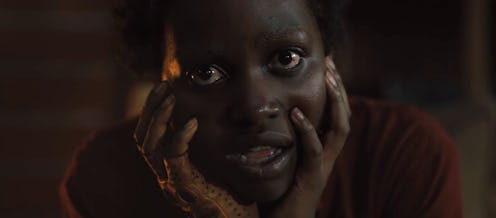Entertainment
Psychologists Break Down Why The Doppelgängers In 'Us' Were So Terrifying
One sentence sets all the chaos off in Us: "There's a family in our driveway." While this line, delivered by the youngest Wilson, wouldn't sound innocent in any horror movie in Us, it's especially foreboding in Jordan Peele's latest film. The antagonists of Us are a group of doppelgängers of the "normal" family moviegoers have already gotten to know by this point. And while there's no doubt that they're creepy as hell, there are a few psychological reasons why we find seeing double so scary. Mild spoilers ahead.
Of course, with any horror movie, you put yourself into the main characters' shoes: What would I do if I was under attack? But there's any added layer when it comes to doppelgängers. They are innately disturbing in a way that monsters or murders who don't look like us aren't. In Black Swan, for example, Natalie Portman's main character sees hallucinations of her own doppelgänger, leading to her not being able to differentiate between reality and her imagination. Twins have also been effectively used to spook viewers, most notably in The Shining, a film which was a big influence for Us director Jordan Peele.
"From a psychological perspective, a replication of the self undermines our sense of reality and who we are," Dr. Pamela Rutledge of the Media Psychology Research Center tells Bustle over email. "This creates a disconnect about control — are we controlling our actions and intentions, and what does that mean about the other?"
This is a key idea in Us — that the Tethered are partially in control of the surface-dwellers' actions and vice versa. Rutledge continues, "The similarity of a doppelgänger means we feel especially vulnerable since, if they are like us, then they know our patterns and weaknesses, giving them an advantage."
The idea of someone else potentially knowing who you are and what you think — enough that they could pretend to be you — is horrifying, for reasons that are not just instinctive, but practical. And as Rutledge notes, with multiple doppelgängers, you can't be sure who anyone is, which means you lose trust. Being scared of someone looking like yourself is one thing; being scared that someone looks like a person who is close to you adds another layer of fear. We don't want things to not be as they seem.
Dr. Sanam Hafeez from Comprehensive Consultation Psychological Services explains in an email that it's also difficult for humans to process seeing someone who looks similar to themselves or someone else, because of what we're used to. "Doppelgängers are simply an effect of genetic computation coming too close for comfort," she tells Bustle. "We, humans, are the only species that have this kind of phenomenal diversity, but sometimes, we can find that there’s another out there who looks a lot like us." She adds, "I think the genetic/phenotype [or observable characteristics] similarity can be jarring."
Rutledge also speaks to this idea and explains that if a double looks slightly different than their counterpart, it should technically make them less scary to a person confronted with one. "If the doppelgängers look different, it would help restore our sense of differentiation, so it would be less fundamentally scary in terms of our self-other boundaries, but still scary in that it would represent a danger and threat."
In Us, specifically, the fact that the doppelgängers are dressed and look a little differently to the main family is necessary to the film's storytelling. It speaks to both groups' distinct environments. Plus, as viewers, we don't know what the deal is with the doubles — whether they are exact clones, a coincidence, or something else entirely — until the very end.
Both Rutledge and Hafeez also mention the folklore of doppelgängers and why a viewer's awareness of the trope of an "evil twin" could increase their fear even more. According to an article on Atlas Obscura, ideas similar to that of the doppelgänger have been around since ancient times in many cultures and have been explored by humans ever since. "As a literary device, the doppelgänger is perfectly suited for exploring human duality, often used to personify the darker traits of a character," the site explains. Atlas Obscura points out that device is seen in Hans Christen Andersen's The Shadow and Edgar Allan Poe's "William Wilson."
If you're Jordan Peele, however, you're more likely to utilize the concept to comment on trauma, socioeconomics, national identity, and other deep ideas. As he told Entertainment Weekly, "I think the main idea that went into writing this film is that we’re our own worst enemy, and that idea created this monster, the Tethered. I wanted to forge this new mythology that explored our duality and the duality of the characters."
While coming across a doppelgänger in real life could be either a really cool or really terrifying experience depending on just how close the resemblance is, a fear of lookalikes on film could have its own benefit.
"Horror films are a way to manage our existential fears (i.e. things are scary and make no sense)," explains Rutledge. "Feeling unsafe and under attack triggers heightened senses due to cortisol and adrenalin. One interpretation says that horror films help us overcome these existential fears by showing us that survival is possible."
While it's doubtful that many people are walking away from Us feeling comforted, that analysis might help if you've been avoiding mirrors ever since.
